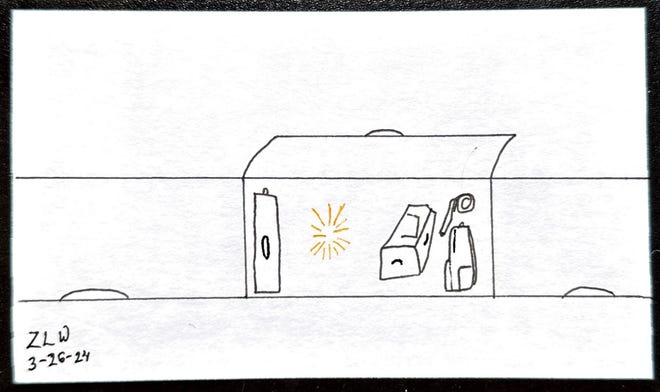I admit it. I'll help you get out of the way so you can board the plane 30 seconds early and get some space in the overhead bin. I'm not bragging, but I'll probably never see them again, and I really hate checking baggage on most flights.
I am part of the problem, but I am not alone. The battle for bags continues to heat up.
“We travel several times a year, about four times a year, and we find that there is no space to put bags over your head. When people get on a plane, they go to the first available (space). ),” Elaine Dicles, a retiree in Minneapolis, told me. “The last few times I've actually gone through baggage checks at the gate, it's just frustrating.”
So how did we get here? Why is overhead shelf space so precious? What can you do about it? Here's what I learned.

Who decides the rules for carry-on baggage?
Most flights have a 1 + 1 rule, with one carry-on bag in the overhead bin and one personal item under the seat in front of you on economy and most domestic flights, but these guidelines are flexible. and is not completely fixed. .
“The airlines set the rules,” Lulu Lima, founder of Texas-based travel company Book Here Give Here, told me. “It's very simple and different airlines have different rules.”
This means that there are no comprehensive regulations regarding the contents of carry-on baggage, just that most airlines use similar equipment and have more or less the same standards.
“Sometimes you hear employees criticize the FAA, but that's not true,” said Brett Snyder, author of the blog Cranky Flyer and owner of travel agency Cranky Concierge.
However, it is always a good idea to check the details of your carry-on baggage allowance when you fly.
Lima said each airline has slightly different dimensions for carry-on baggage, and each ticket has different rules. Some basic economy tickets may not allow overhead baggage, and ultra-low-cost carriers like Spirit and Frontier may charge extra for carry-on bags.
What's the best way to free up overhead shelf space?
Unfortunately, there's no good strategy here. The best way to access bins on most airlines is to be in an early boarding group. This usually means owning a more premium ticket, obtaining airline frequent flyer status, having a suitable credit card, or paying an access fee.
“I don't want to say too much, but sometimes you sign up for a credit card that lets you board early, or you buy a space that lets you board early. It really depends on the airline,” Lima said.
Why is overhead shelf space less competitive?
First, let's briefly explain why bin space is so sought after.
“We originally got there when checked bags were still free, and people were primarily concerned about their checked bags getting lost,” Snyder said. People don't want to pay for it. ”
Lima agreed that a big part of the reason why so many passengers rely solely on carry-on luggage while traveling is their distrust of airlines.
“We're all control freaks to some degree,” she said. “I can't trust this bag to actually work. Why do you think AirTags and tiles and everything else are so popular these days?”
Airlines are aware that access to bins is competitive and frequently advertise improvements that mean more space for wheelchairs. In fact, just Tuesday, United Airlines announced it would install large trash cans on Embraer E175 regional jets operated by SkyWest. Regional jets typically fly short routes and are known for having limited carry-on space.
But airlines can't do much to compete beyond physical improvements to overhead bins.
Snyder said passengers can be encouraged or required to gate check their bags, but it can backfire, especially if they start forcing checks before the overhead bins are truly full. I admitted something.
And, of course, airlines can charge for access to overhead bins, which is unpopular with passengers, but it does make the process at the gate smoother.
“There are airlines like Spirit and Frontier, and they charge more for carry-on than they charge for checked baggage,” Snyder said. “There's no mad dash to get on board to make room for a bin like you'd see on other airlines.”
However, the effectiveness of these practices is somewhat limited.
For Dicleche and her husband, Clifford, they wonder why airlines don't allocate slots to seats like overhead bins, but to be honest, this is a question I don't have an answer to either. I think that's a question.
Expert packing tips
Until some new innovation or some kind of magic makes overhead bin space unlimited, we'll be left competing with our fellow passengers for whatever we can get.
Lima, who usually travels with only carry-on luggage, said she can minimize the amount of space she needs by being strategic about what and how she packs.
“I went to China and Finland for three weeks, and there were a lot of temperature changes,” she said. “I'm all about rolling. As a plus-size woman, my clothes are bigger than everyone else's, so if I can do it, others can too.”
For Snyder, the best way to avoid stress is to decide not to rely on trash cans at all.
“Traveling without a carry-on bag is incredibly liberating. Suddenly I don't care when I board or whether I have an assigned seat,” he said.
And I've seen with my own eyes that checked baggage systems are becoming more and more reliable. I'm going to fight you over the overhead shelf space for now, but I might return to Snyder's opinion.
Zach Wichter is a travel writer for USA TODAY based in New York. Please contact us at zwichter@usatoday.com.


